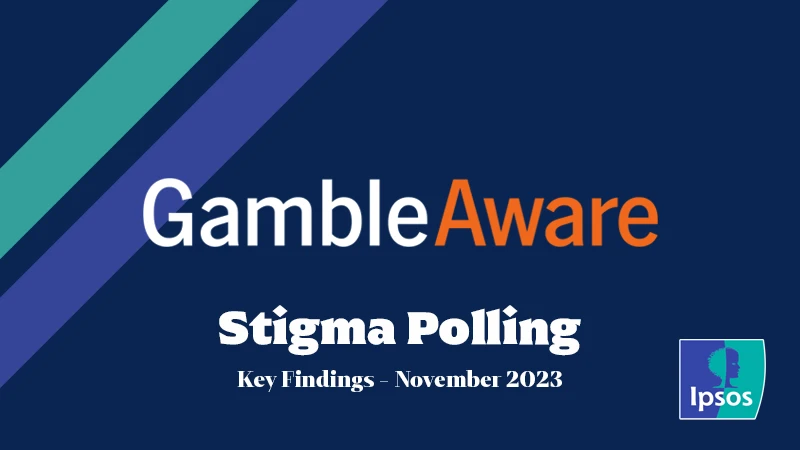It’s good to talk: new study reveals importance of talking about harmful gambling

We’ve all heard of harmful habits being kept a secret, whether it’s sneaking for a cigarette or stashing vodka in the bathroom. According to a recent GambleAware-commissioned report, comparable behaviours are seen in many people with gambling problems.
Safer Gambling Week 2023
Safer Gambling Week is now in the rear-view mirror, and appears to have been a resounding success. According to the Betting & Gaming Council, the seventh Safer Gambling Week received a 70% uplift in promotion this year, boosting reach and increasing awareness.
Key initiatives include uniting different stakeholders within the British gambling industry against problem gambling, educating players on how to use safer gambling tools, including which early warning signs to look out for, and how they can make best use of the different support organisations available to them.
The recent study
The report, commissioned by GambleAware as part of its ‘stigma reduction campaign’, explores the extent to which problem gamblers will talk about their behaviour, the effects of talking about these problems, and the reasons behind this.
Over 4,200 gamblers aged between 18 and 75 were surveyed across Britain, with approximately a quarter reporting experiencing gambling-related issues.
The report found more could be done to encourage players to ‘open up’ – defined as either seeking professional help, or talking to family and friends about their gambling behaviours.
A staggering 64% of respondents who experienced gambling problems claimed never to have spoken to anyone about it. And almost a third of those who had, waited more than a year to do so.
Those players who had opened up about problem gambling had benefited, feeling more positive about their situation and wishing they had reached out sooner.
According to the GambleAware report, the main reasons for problem gamblers choosing not to speak about their issues are feelings of guilt or shame, concern that others will judge them, or believing they are capable of dealing with the problem themselves.
The report proposes additional efforts be made to promote the discussion of gambling-related issues, and that steps should be taken to reduce stigma and discrimination associated with problem gambling.
The upside
Despite some of the negative numbers, It appears that many gamblers who experience problems are aware of the importance and value of talking, and aren’t reluctant to reach out for a helping hand.
In fact, the Gambling Commission estimates that problem gambling affects only 0.2% of Brits, and statistics show a large number of these make use of their support networks.
There are several UK organisations who focus on reducing gambling-related harm, treating many gamblers each year, indicating that many of those who need to speak to someone manage to do so.
It may even be the case that younger generations, who are generally more adept when it comes to sharing feelings, will be more confident with open, or 'tricky', communication than older generations.
Similarly, as society becomes more open, and people ‘open up’ more readily than they once did, gamblers who have exhibited problematic behavioural patterns in the past may, with time, become more willing to share their experiences.
Clearly, there are plenty of players who are capable of practising responsible gambling, and who know when it’s time to reach out for help. While not all gamblers struggle in this respect, those who do deserve our support.
Need to talk?
Fortunately, for players needing someone to talk to, there are several organisations to choose from. Here are some of the first points-of-call for players who feel they need to share thoughts and possible concerns about their gambling.
- GamCare is a great place to start for anyone who’s struggling. They’re available 24/7 with a plenty of ways to get in touch. Their website also contains helpful resources.
- GambleAware is available 24 hours a day, 365 days a year, providing advice, support, or a friendly ear to those who need it. They can be contacted through their live chat service or by phone.
- Safer Gambling UK runs Safer Gambling Week, and its website features plenty of helplines, guides to using self-exclusion tools, and more.
Just as a reminder, here are some early warning signs to look out for:
- Spending more than you intended in a gambling session.
- Arguing with those close to you about gambling.
- Chasing losses.
- Borrowing or selling possessions to fund betting.
- Missing work or other commitments.
- Gambling in secret.
To conclude
In the wake of Safer Gambling Week, the importance of talking about our problems, whatever they may be, is as clear as ever. The government has recently pledged support for GambleAware’s stigma reduction campaign.
Whilst a large proportion of problem gamblers appear to have difficulties doing this, it should be remembered that problem gambling only impacts a very small minority of gamblers.
With such an extensive support network already available to British gamblers, it seems that the key focus areas for gambling support organisations should be breaking down the barriers which prevent people from discussing their problems, whether that’s with family and friends, or a dedicated service.
Talking about problems is the first step towards solving them. We need to aspire to a culture where nobody is afraid to make use of the services available to them.
